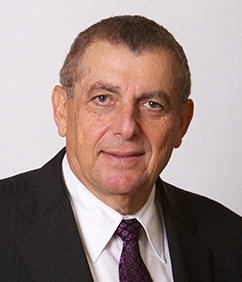A real estate career shaped by tax expertise: Leonard Wilf LLM ’77
A Q&A in celebration of the 75th anniversary of the Graduate Tax Program
When Leonard Wilf LLM ‘77 first applied to NYU Law to earn his JD, he was put on a waitlist. He eventually attended Georgetown Law—but a few years later, he attended his dream school for his LLM. “I had only wanted to go to NYU Law, but I didn’t achieve my wish the first go-round,” Wilf says. “I did do it the second go-round.”
After earning his LLM, Wilf joined his family’s real estate business, Garden Homes Development, where he currently serves as president. He is co-owner and vice chairman of the Minnesota Vikings football team and co-owner of the Nashville SC soccer team.
Wilf credits much of his business acumen to the tax knowledge he acquired during his time in the LLM program. As a way of giving back, he serves as a member of the Law School’s Board of Trustees and as vice chair of NYU’s Board of Trustees. With his cousin Mark Wilf ‘87, he generously provided funding for NYU Law’s Wilf Hall, which opened in 2010.
Wilf’s philanthropy extends beyond the Law School. The Wilf Family has contributed to causes dedicated to COVID-19 relief and assistance, and supports social justice efforts as well, offering support toward organizations opposing racism and inequality.
Wilf recently joined Professor Steven Dean, faculty director of the Graduate Tax Program, for a conversation about the versatility of an LLM and how it shaped his views on business and philanthropy.
Steven Dean: What was it about tax specifically that got you interested?
Leonard Wilf: I was working in a real estate firm and they were doing a lot of 1031 [like-kind exchanges], and I didn’t really understand them at the time and all their nuances. So I figured I better get up to speed.
Dean: How did your LLM education influence your work in the real estate industry?
Wilf: I was working for my father and uncle, and they had a nice real estate business, not huge, but nice. And there was a thing in New York, I think it was called the Section 255 mortgage recording tax. And I had learned that there was a way to save the mortgage recording tax by creating, for lack of a better term, a place holder. And I did that for them, and in those days, a long time ago, I saved five thousand dollars. That really, really impressed them, that I knew that and they didn’t know it, and from that day forward, I got rolling.
Dean: So I’m curious because you’re involved in sports, which is an understatement, do you feel your LLM education played a role in that at all?
Wilf: Absolutely no question about it—and not only because of the education I received at NYU, which was a long time ago. I’ve tried to keep up with all the changes over the years that have come with the tax code, and whenever I had a question in the last 20 years, I always made it my business to ask somebody at the law school.
Dean: Any faculty members in particular?
Wilf: I got to know Michael Schill pretty well and I spent some time with Frank Upham also, and I learned an awful lot. Not necessarily tax, but we would have what I call pretty significant intellectual discussions. His favorite topic was property rights in China and/or the lack thereof and how it has not impeded their economic development. Whereas, we here in America, we take property rights and regulations to be one of the bellwethers of our economic system, and yet in China, they’ve turned that upside down. That was an interesting intellectual discussion.
Dean: Changing gears a little bit, what are the aspects of tax that you think would be most beneficial for the population at large to understand?
Wilf: I would start with point one that tax policy in and of itself doesn’t change the world. It can only adjust it a little.
In my opinion, in this last 20 years the real change that I see economically is the cost of money has become so much cheaper. When I started in business, if you were borrowing money, you were paying, minimum, six percent, sometimes seven, eight, or nine. That hasn’t happened in years. Now, what does that mean for the world? It created what I call an “easier borrowing capacity,” and that allowed more people to buy a house, buy a car, whatever it is. If you look back historically, that’s really been the motivation for the growth in the economy, not the tax policy.
What I didn’t see, and it should have happened, was philanthropy should have taken advantage of the lesser cost of borrowing also. Philanthropy has always been dollar for dollar—there’s no borrowing, there’s none of that stuff. So I think that that’s something that might be worthwhile to teach. If you’re teaching a course in tax and philanthropy, that’d be an interesting concept.
Dean: That actually brings up a question I wanted to ask as well, how has your knowledge of tax law shaped and informed your views on philanthropy?
Wilf: Obviously, America is one of the few countries where there is a “tax motivator” to make philanthropic donations. It would be an interesting study in international tax, [to ask] what are the tax ramifications of philanthropy in different countries? My guess is that America has the highest amount of per capita philanthropy, and I’m going to guess that part of that motivation is the tax law. I’m a great believer in philanthropy; I think it does a lot of good things. It certainly has over the years created a lot of things that would not otherwise have been created.
Posted November 5, 2020. This interview has been condensed and edited.


